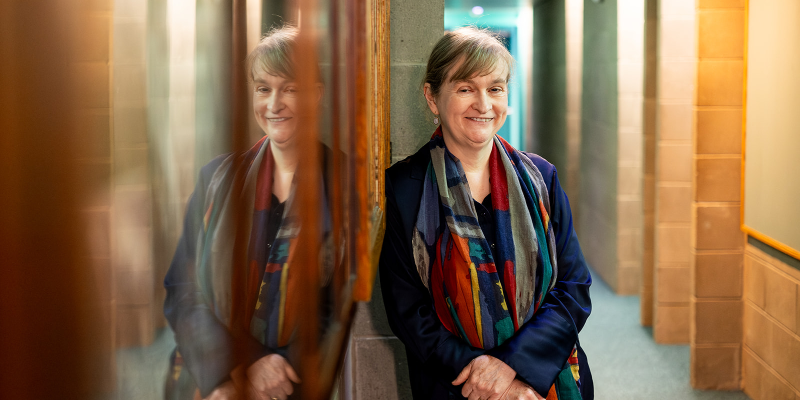
Deirdre Madden on Marilynne Robinson’s Housekeeping
In Conversation for the Windham-Campbell Prizes Podcast
The Windham-Campbell Prizes Podcast features a series of conversations with past and present Windham-Campbell Prize winners about their favorite books and plays. Hosted by Michael Kelleher.
Deirdre Madden (winner of a 2024 Windham Campbell Prize for Fiction) joins Michael Kelleher to talk about Marilynne Robinson’s classic novel Housekeeping, siblings, writing with a density of language, and the unacknowledged humor present even in hard times.
For a full episode transcript, click here.
*
Reading list:
Housekeeping by Marilynne Robinson • Moby-Dick by Herman Melville • Carl Jung • William Shakespeare • Reading Genesis by Marilynne Robinson
*
From the episode:
Michael Kelleher: I was so obsessed with this last couple days: one of the, I think, really fascinating mysteries of this book is where Sylvie has been before she comes to the house, right? Like After Helen leaves with her husband, elopes, moves to Seattle, then comes back home and has like a proper marriage and then goes back to Seattle where she has a couple of children.
Then Sylvie, apparently, according to the narrative, follows her to Seattle and then at some point comes home herself and marries somebody named Mr. Fisher, who we get like almost no information about throughout the book. Like he may have been in the war, he may have fought in the Pacific, but that like literally, that’s all we know and I couldn’t help wondering.
If she had had an affair with Helen’s husband or something, you know, like, like there was something, there’s something in that past that nobody wanted to talk about, that that, that I just kept wondering about. it’s pure speculation. There’s no evidence in the text for it. But there was, there’s something there, you know?
Deirdre Madden: Well, it’s a novel, so it, it didn’t really happen, Mike.
MK: But it happened in here! [taps head]
DM: Yeah, yeah, I think that it’s another… I think she was a transient, like the way she talks about people and the people she meets in bus stations and about being on the trains and talking to people on the trains, and I think her whole openness to other people and her non-judgmental nature.
This is Sylvia I’m talking about. I think that comes from somebody who is sort of outside society and who knows both the best and the worst of society, in the way you probably only can if you’re at the very bottom of society. and I think that is one of the things that makes her, a very, very sympathetic character. I think she’s full of kindness and compassion, and she’s very nonjudgmental. She sort of can glide over things and pass over them. I think that there’s something quite beautiful about where her soul has ended up with all of this.
And I think that it’s in the sort later passages of the book that this comes across when she talks about the people she has met in bus stations who like tell her all about their children. And then she says, actually, I don’t think that person did have any children. But if they wanted to imagine their children, well, why not?
You know, it’s, it’s that sort of imaginative openness that is there side by side with this very sort of strict small town morality, I suppose, which is embodied in the policeman who comes to the house and maybe in some of the teachers and neighbors, the people who bring the casseroles and the food who are concerned.
But there’s a sort of respectability thing that it’s that Sylvia and the girls aren’t fitting in, the family did not subscribe to conventional norms. And that in itself by their lights isn’t right.
*
Deirdre Madden is a writer from Toomebridge, County Antrim, Northern Ireland. The author of eight acclaimed novels, she has twice been a finalist for the Women’s Prize for Fiction (2009, 1996) and has received numerous other awards and honors, including the Hennessy Literary Awards Hall of Fame (2014), the Somerset Maugham Award (1989), and the Rooney Prize for Irish Literature (1980). Madden holds a BA from Trinity College, Dublin and an MA from the University of East Anglia. She has been a member of Aosdána, the affiliation of creative artists in Ireland, since 1997, and is currently an Associate Professor of Creative Writing and Co-Director of the M.Phil in Creative Writing at Trinity College, Dublin.
The Windham-Campbell Prizes Podcast is a program of The Windham-Campbell Prizes, which are administered by Yale University Library’s Beinecke Rare Book and Manuscript Library.
Windham-Campbell Prizes Podcast
The Windham-Campbell Prizes Podcast features a series of conversations with past and present winners of the Windham-Campbell Prizes about books and plays that they love, hosted by prize director Michael Kelleher. The Windham-Campbell Prizes are administered by Yale University Library’s Beinecke Rare Book and Manuscript Library. The podcast is a co-production between The Windham-Campbell Prizes and Literary Hub. Hosted by Michael Kelleher. Production & Engineering by Drew Broussard. Music by Dani Lencioni.



















